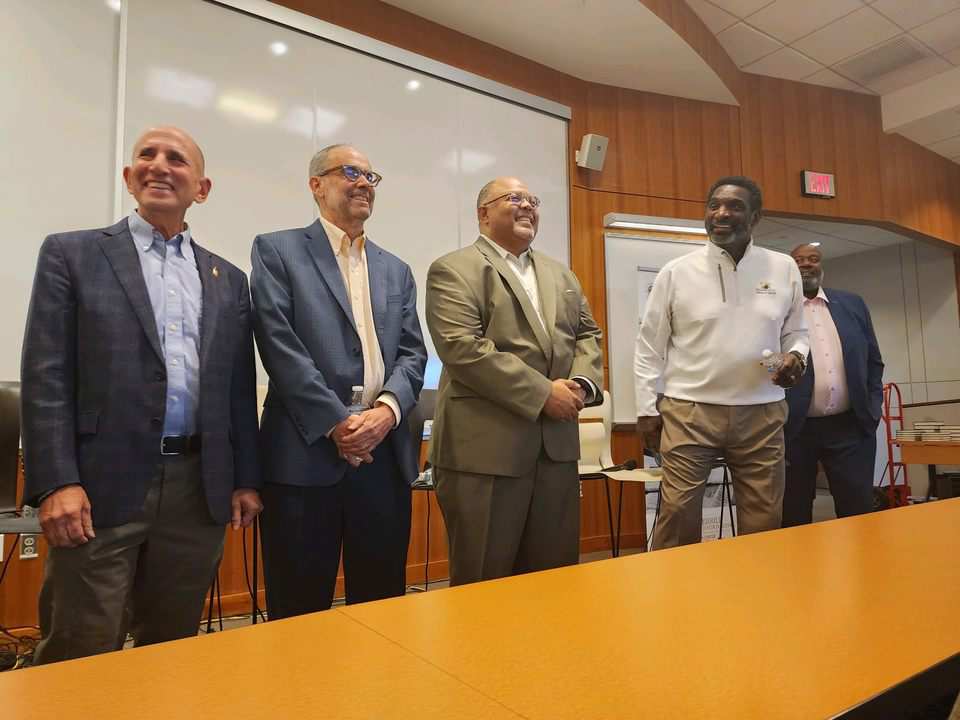Panel featuring Coach Locksley and Doug Williams discuss book "The Rise of the Black Quarterback."
The panelists plus faculty for “The Rise of the Black Quarterback” discussion. From left to right: Mark Hyman, John Eisenburg, David Steele, Doug Williams and Michael Locksley (Mauriah Allen/ The Black Explosion.)
The Shirley Povich Center for Sports Journalism hosted a panel on Thursday featuring five influential men in the sports industry who shared their thoughts on Jason Reid’s book “The Rise of the Black Quarterback.”
The panel was hosted by Jerry Bembry, senior writer for ESPN’s Andscape, a sports and pop culture website. The panel explored how quarterbacks, once a whites-only position, transitioned to a racially inclusive role. There are 14 Black starting quarterbacks today.
Black quarterbacks have a history of huge breakthroughs in football. Stories of Black players overcoming the adversity of being able to play the quarterback position have been well documented in Reids book as well as the panel.
The panelists included John Eisenburg, author and former columnist for the Baltimore Sun and Baltimore Ravens; Michael Locksley, head coach of the University of Maryland Football Team; Jason Reid, senior writer for ESPN and author of “The Rise of Black Quarterback: What It Means for America”; David Steele, a professional sports journalist; and Doug Williams, the first Black quarterback to both start and win a Super Bowl and senior advisor to the Washington Commanders’ president.
Benji Kaufman, a sophomore journalism major, asked the panel how protocol has changed for quarterbacks.
Locksley answered by saying that the high schools are the reason the protocol has changed, stating that high schools developed more black quarterbacks who can run zone reads - where the quarterback studies the defense to decide if he should keep the ball or throw it.
Eisenburg made a point that there will no longer be a world where a Black player can't play football.
“No more will anyone in the big rooms tell a Black person they can’t play,” said Eisenburg.
Williams added onto the conversation saying that the industry of football can't afford to not have African American athletes playing. He said that the first Black quarterback who won a Super Bowl was in 1988 - Russel Wilson repeated the success 25 years later.
“General managers, owners and coaches want to win, they can’t afford to ignore the money Black players [are bringing] in,” said Williams.
The green that managers reaped for their own gain, Reid said, triumphed over the diversity of Black players.
Current NFL quarterbacks have faced a lot of adversity in their careers. In the NFL draft, Black athletes face a stigma that they are “too athletic” to be quarterbacks, said Locksley.
“Lamar Jackson was the last pick in the first round, Jalen Hurts went in the second round and Dak Prescot went in the fourth round,” said Eisenburg.
Bembry asked the panelists how they think players felt during the time of racial biases within the league and how they stopped complying with the NFL stigmas.
“This day and age guys like Jalen aren't going for it. Doug's success has led many others to do [incredible] things,” said Locksley.
Williams shows that players' defiance to inequality in the NFL has risen and, finally,players are recognizing their worth.
“Charlie Ward is the best Heisman award receiver who told the NFL no. No, I'm not playing another position, I'll just play basketball,” said Locksley.
The panelists believe that a corner has been turned but agreed there is still more progress to be made.
“There is no question a corner has been turned, but look at the sidelines on Sunday, who are the backups? More white back-ups then black back ups,” said Williams.
Williams added that Black quarterbacks have come a long way since the beginning of football and the evolution looks to be on the uprise.

